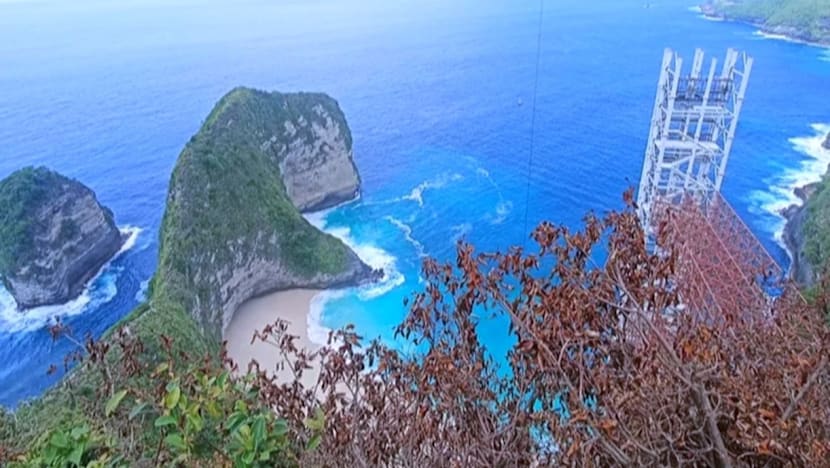Bali halts construction of controversial cliffside glass elevator after backlash
The project, already 70 per cent complete, was built in a disaster-mitigation area and could now face permanent closure.


This audio is generated by an AI tool.
DENPASAR: Authorities in Bali have ordered the suspension of construction on a controversial glass elevator being built at Kelingking Beach, one of the island’s most photographed tourist destinations, following widespread criticism over environmental risks, safety concerns, and alleged permit violations.
Kelingking Beach, known for its dramatic dinosaur-shaped cliff and turquoise waters, has become one of Bali’s most popular natural attractions, drawing crowds who have to brave steep hikes down a narrow staircase for picture-perfect panoramic views.
The 182m-high glass elevator, is designed to have several stops along the way, allowing tourists to step out and enjoy panoramic views of the cliffs.
It has come under heavy scrutiny for reportedly breaching Indonesia’s spatial planning laws and also threatening the integrity of the surrounding natural landscape.
The decision to halt work was made by the Bali Regional House of Representatives’ Special Committee on Spatial Planning, Assets, and Licensing (TRAP) on Oct 31, which found that the development violated national regulations on land use and coastal zoning.
“The structure stands in a designated disaster mitigation area where large-scale construction is prohibited,” said committee chair I Made Supartha in comments carried by local media outlets.
He added that the elevator’s design also clashed with Balinese architectural traditions and risked spoiling the natural beauty that draws visitors to the area.
A PROJECT MEANT TO EASE ACCESS
The 200 billion rupiah (US$12 million) project, supported by Chinese investors and managed by Indonesian developer PT Bangun Nusa Properti, began in July 2023 with the goal of improving access to the beach.
Director I Komang Suantara said the company had complied with all legal and technical requirements, including environmental and soil-strength studies.
“Our permits were issued under the latest regional spatial and building regulations, however, we will respect the authorities’ decision to pause construction,” Suantara said, also noting that the project had been around 70 per cent complete when the suspension was announced.
Footage circulated on social media earlier this year, showing cranes and steel frameworks in the area, sparking outrage from locals who accused developers of disregarding Bali’s environmental safeguards.
The debate over the elevator has divided tourists. While some argue that the project undermines the natural appeal of Kelingking Beach, with the steep trek being part of the beach’s memorable experience - others believe that a cliffside elevator would make the site more accessible.
“Go with your own strength - don’t use a lift. It’s supposed to be a challenge,” said one Swiss tourist who spoke to the Kumparan news site.
Eva, a 24-year-old domestic visitor from Jakarta, said she welcomed the project and described the climb down as “almost unbearable”.
“I didn’t expect it to be that steep. I nearly regretted going down but there was no choice. I had to climb back up slowly,” she said, adding that she hoped authorities could find a compromise between safety and conservation.
DISAGREEMENT OVER PERMITS
Balinese officials sealed off the site last week, after discovering that the project lacked proper permits and also posed safety risks.
I Dewa Nyoman Dharmadi, municipal chief at Bali’s Civil Service Police (Satpol PP), said the development had approval only for limited use of the cliff area - not for building a major permanent structure.
“The project sits within a protected zone and violates coastal setback rules,” he said. “We’ve halted construction and cordoned off the area for safety.”
Other officials raised concerns about the project’s materials and warned that the site could be permanently shut down if violations were confirmed.
Klungkung Regent I Made Satria said the project had received approval before he took office early this year, and added that developers claimed to have valid permits.
“Local residents told me there were several rounds of consultation, and they supported the project,” Satria told local media outlets, adding that his administration was now reviewing documentation.














